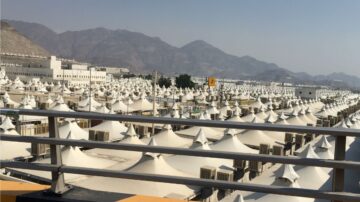People thought it was impossible to go around the world in 80 days. So what would they think about making that trip in only one day? Well, it is possible on the day of Arafah, the essence of Hajj. Taking a look around at all the pilgrims standing on the Mount of Mercy on the day ofArafah, they will all look pretty much the same: A white mass of over 2 million people standing shoulder to shoulder, in solemn humility to Allah. But on taking a closer look you will see beyond the dress code and notice the diversity of ethnicities in Islam.
The First Call
Some may think that the first to mention Hajj was Prophet Muhammad (peace and blessings be upon him). But in fact, it was Prophet Ibrahim (Abraham, peace and blessings be upon him) who made the first call, as he was ordered by Allah:
(And proclaim unto mankind the pilgrimage. They will come unto thee on foot and on every lean camel; they will come from every deep ravine.) (Al-Hajj 22:27)
After Prophet Ibrahim had finished the construction of the Kabah he stood on the Mount of Mercy and made the call for Hajj. Although all that echoed back were his own words, Allah conveyed his call, which is now answered by millions of Muslims. One God, One Ummah For centuries, Muslims from all over the world have traveled to Makkah to perform Hajj, the fifth pillar of Islam. Although the pilgrims are of diverse races and cultures, they hardly take notice of these ethnic differences. They are all performing the same rituals, praying towards one direction (the Kabah) and supplicating to one God, Who unites them under His guidance and protection.
Color, nationality, and wealth were never an issue in Islam. Color, nationality, and wealth were never an issue in Islam. During the lifetime of the Prophet (peace and blessings be upon him) all his Companions were different. Some were rich like Abdur-Rahman ibn Awf and Uthman ibn Affan, who were very famous and successful tradesmen. Others like Abu Hurairah and Bilal ibn Rabah were extremely poor. But despite all of their differences, they all lived united by their love for Allah and His prophet.
In fact, some of the Prophet’s dearest and closest Companions, who proved their devotion and valor for Islam, were non-Arabs. One was Bilal ibn Rabah, who was a poor slave, originally from Abyssinia (modern-day Ethiopia). After embracing Islam, Bilal was subjected to brutal torture by his non-Muslim master, so in order to relieve his pains, Abu Bakr As-Siddiq bought Bilal and then freed him. When commenting on this situation, Umar ibn Al-Khattab used to say in humbleness, “Abu Bakr is our master and has freed our master [Bilal]” (Al-Bukhari).
Bilal was also given the honor of being the first to call to prayer in Islam, as he was known for his mellow voice. Also, Salman Al-Farisi was a slave, originally from a Persian town called Ram-Hurmuz (Al-Bukhari). Being a salve or a non-Arab did not stop the Prophet (peace and blessings be upon him) from holding him in high esteem and saying that Salman was one of the members of his household (At-Tabarani). The only measure of superiority and goodness in Islam is a person’s piety and God consciousness.
Abu Hurairah reported that while some of the Companions, among them Salman Al-Farisi, were sitting in the company of the Prophet, Surat Al-Jumuah was revealed. When the Prophet recited (Others from amongst them (the believers) who have not yet joined them) (Al-Jumuah 62:3), one of the Companions asked, “Who are they?” So the Prophet placed his hand on Salman and said, “Even if faith was as far as the Pleiades, a man from among these (the non-Arabs) would surely seek and find it” (Muslim).
Arabs ONLY? Islam is sometimes seen as a religion for Arabs only because Prophet Muhammad, who conveyed this message, was an Arab. But a verse in the Qur’an rejects this viewpoint and says what means: (And We have not sent thee (O Muhammad) save as a bringer of good tidings and a warner unto all mankind; but most of mankind know not.) (Saba’ 34:29)
The Prophet himself clarified to all Muslims, in a sermon during the Hajj season, that being superior has nothing to do with a person’s ethnicity, language, or race. Whether a person is Arab, non-Arab, yellow, black, or white is of no significance. The only measure of superiority and goodness in Islam is one’s piety and God consciousness (Ahmad). Allah also says in one verse, concerning peoples’ ethnical differences, what means: (And one of His signs is the creation of the heavens and the earth and the diversity of your tongues and colors; most surely there are signs in this for the learned.) (Ar-Rum 30:22)
On another occasion, the Prophet stressed the point of equality in Islam by saying, “Verily Allah does not look to your faces and your wealth, but He looks to your hearts and to your deeds” (Muslim). This assures that Allah never judges people according to their wealth or color, but what counts are their intentions and deeds. Islam has broken down all boundaries of color, language, and race, so that all Muslims could relate to one another, regardless of their differences. So whoever said that Islam is a religion for Arabs only? Join us on our discussion forum on non-Arab Muslims by clicking here.
By Hala Salah

